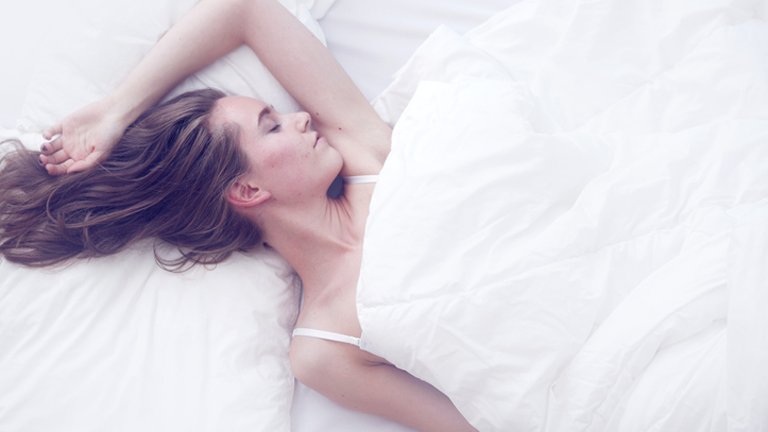Got insomnia? Nutritionist Rick Hay brings you the best foods to help you sleep
It’s official, Brits don’t sleep enough. Research published last December found a staggering 38 per cent of Brits are not getting enough sleep with women aged 35-44 affected the worst. The survey, conducted by life insurance company Aviva looked at the sleep habits of 14 habits globally and found Britons were the worst sleepers.
People have been using food and herbs traditionally for centuries to help them nod off, from cups of hot milk to camomile tea. Now, we’re starting to understand the reasons behind some of the foods that help calm the body and promote a restful night’s sleep. Healthista spoke to nutritionist Rick Hay about the food news all insomniacs want to hear – foods that have been proven to help aid sleep.
GREEN, BLACK AND WHITE TEA
‘Certain amino acids found in foods can help with sleep by nourishing the nervous system’, says nutritionist Rick Hay. ‘One of those being closely studied right now is L-theanine, dubbed ‘the relaxation amino acid’ and found in green tea, black tea, white and matcha green teas. L-theanine is an amino acid found to enhance sleep and also help reduce anxiety in a growing number of scientific papers’.
A 2008 study in Asia Pacific Journal of Nutrition examined the brain activity of healthy adults after they consumed L-theanine and found it increased alpha brainwave activity. Alpha waves are brainwaves that promote relaxation. 400mg of L-theanine taken as a supplement (we love Higher Nature Theanine, £22.45 for 90 capsules) has also been found to help sleep quality in young boys with Attention Deficit Disorder (ADHD). In a randomised, placebo-controlled study published in Alternative Medicine Review in December 2011, 98 boys aged 8-12 were given 400mg of L-theanine daily (two doses of 200mg) for six weeks, their ADHD-related disturbances in sleep appeared to be reduced. What’s more, a significant improvement in sleep efficiency (that means more time asleep relative to awake) and movement during sleep was also observed in the boys during the study.
CAMOMILE
‘The health benefits of humble camomile tea have been shown to be wide-ranging, from anti-inflammatory properties to wound healing, anti-diabetes and even benefits to the common cold and cardiovascular health,’ says Hay. ‘It’s best known for its effect on sleep and that’s not without some great evidence, thanks to a flavonoid it contains called apigenin and that has anti-anxiety properties. It binds to receptors in the brain that increase levels of GABA, a neurotransmitter that can have a calming and sedative effect.’
In a fascinating though small study, ten cardiac patients fell into a deep sleep for 90 minutes after drinking camomile tea and it (along with passiflora herb – see below) has been shown in another study on sleep disturbed rats to have hypnotic effects. ‘What’s also interesting to note is that the inhalation of camomile as an essential oil could also help calm you down before bed,’ says Hay. In one study, inhaling camomile powder decreased blood levels of ACTH in overactive rats. ACTH is a substance that stimulates levels of the stress hormone cortisol. So it’s not just your granny’s old wive’s tale after all.
TRY: Absolute Aromas Organic Chamomile Roman Oil, £11.95
MORE: 9 anti-ageing foods proven by science
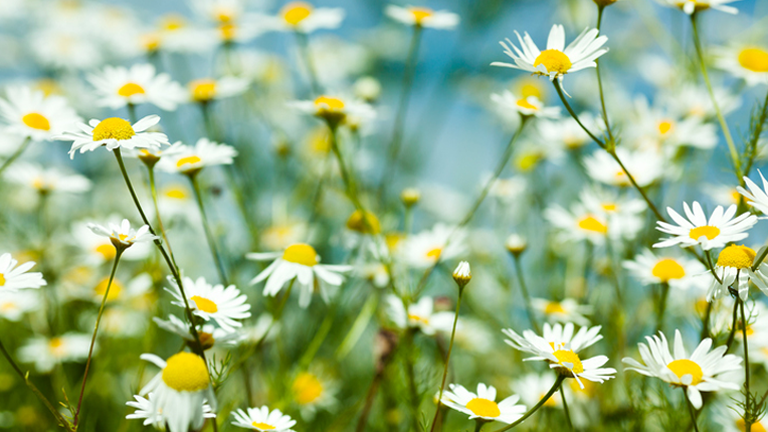
CINNAMON
Cinnamon nourishes the nervous system by calming the blood sugar levels, explains Hay. Indeed, repeated research has shown it can even help lower the blood sugar levels of Type-2 diabetics. ‘This is important from an insomnia perspective because often if you find yourself waking up in the small hours, it could be down to blood sugar spikes that subsequently wake you up as your blood sugar drops,’ says Hay. A small bowl of porridge with cinnamon before bed or even a little cinnamon in some camomile tea could make early morning waking easier.
TRY: Bio Health Cinnamon Bark, £7.83 infused in some tea.
MORE: Need a protein powder for weight loss? These are the ingredients to look for
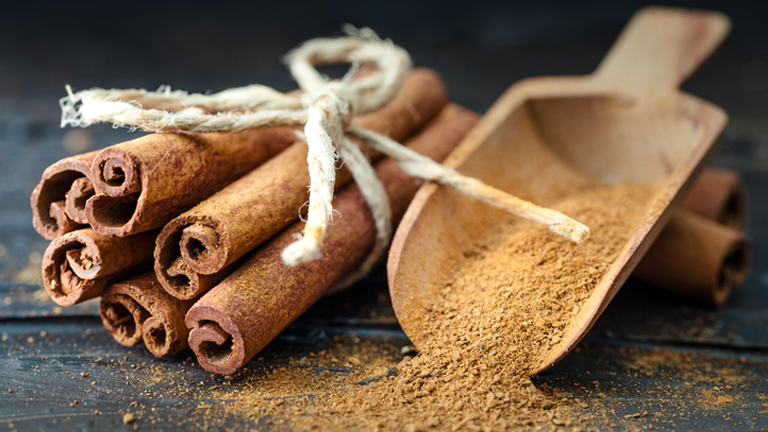
GINGER
‘Ginger calms the stomach, via a chemical ingredient called gingerol which helps with stomach contractions,’ says Hay. ‘It also relaxes the system generally and is also a good circulatory tonic,’ says Rick Hay. One randomised controlled study published in the journal Complementary Therapies in Medicine looked at the effects of taking a supplement containing ginger (along with other herbs and fruits) and showed that it reduced the time it took for insomniacs to fall asleep. Ginger is a great overall tonic for the nervous system too, Hay asserts. A 2010 study published in the journal Bioorganic and Medicinal Chemistry found that ginger might bind to the brain’s serotonin receptor which could have a calming effect on anxiety. ‘Serotonin is the brain’s feel good neurotransmitter,’ explains Hay.
Healthista hint: If you’ve eaten a big meal near bedtime, take ginger tea made with half a teaspoon of grated ginger and a cup of water boiled for five minutes for better nighttime digestion and to help sleep.
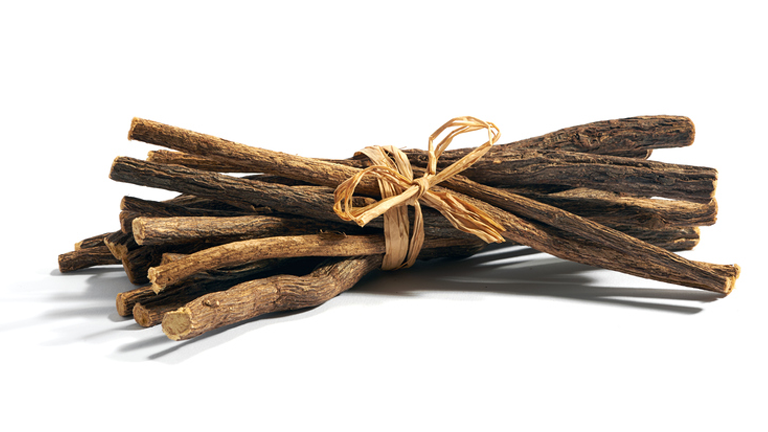
LIQUORICE
Liquorice has long been used by naturopaths as a herbal medicine for depression and anxiety. ‘Liquorice is known by people that study botanical medicine as an adrenal gland tonic,’ says Rick Hay. Your adrenal glands are responsible for the release of stress hormones and a busy high-pressure lifestyle can quickly leave them depleted, causing anxiety and depression. ‘Adrenal tonic herbs or plants help to nourish the adrenals and calm a frazzled system. Be careful that you don’t take too much liquourice though as it can promote energy production as well,’ asserts Hay. But research conducted on mice in 2012 published in the journal Bioorganic Medicine and Chemistry found that the active ingredient in liquorice called gabrol, a flavonoid, could help bind to GABA receptors in the brain which stimulate relaxing alpha waves and led to the mice in the study getting deeper and longer sleep.
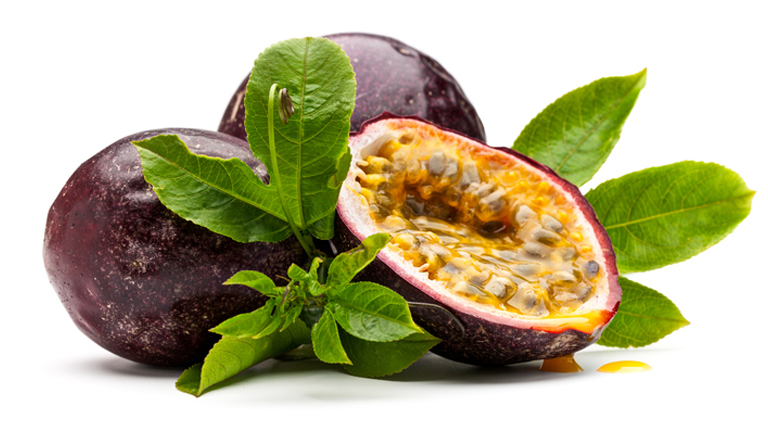
PASSIONFRUIT
‘Another favourite is passion flower or passionfruit, this has had a lot of traditional use over time for calming the nervous system,’ says Hay. Passionfruit and passionflower (sometimes called Passiflora as a supplement) contain a compound called harman that has a hypnotic and sedative effect which has been shown to help insomnia and anxiety. It’s also been shown to help decrease anxiety and the quality and depth of sleep (taken as a tincture or tablets).
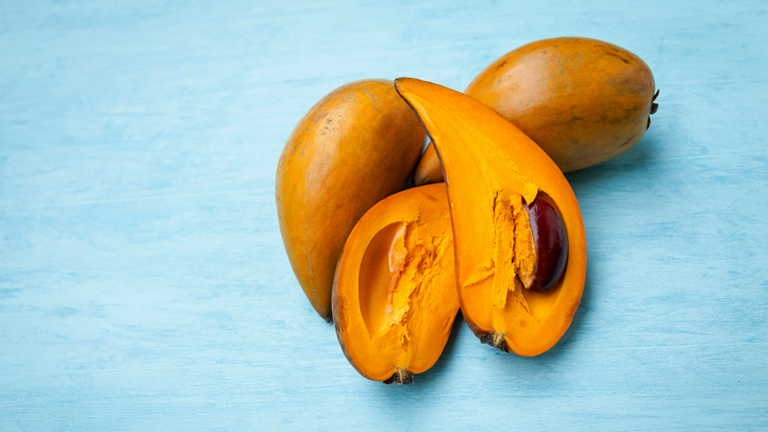
LUCUMA
This South American sub-tropical fruit is literally jam-packed with nutrients. Good news is, the powdered form tastes quite sweet, a little like maple, so can be used as a natural sweetener. Even better, it balances blood sugar instead of spiking it – as sugar does – because it has a low Glycaemic Index (GI). ‘Having a low GI means it could help balance blood sugar before bed,’ says Rick Hay. ‘This is important because if you eat foods with a high GI before bed – this includes white pasta, rice and bread – you could, end up with spiking sugar levels in the middle of the night, which can lead to waking up with a start and not being able to get back to sleep.’ Interestingly (though rather random), a 2014 study published in the Journal of Cosmetic Dermatology found that lucuma oil applied topically could potentially help with wound healing!
LEMON, LIME AND BLOOD ORANGE
‘Lemon, lime and blood orange are rich in vitamin C,’ says Rick Hay. ‘This isn’t just just an immune booster but also nourishes the adrenal glands. When you nourish your adrenal glands the system calms down which can help with the anxiety and stress that can cause insomnia.’ Studies have also shown that a lack of vitamin C could contribute to sleep loss.
BAOBAB
Like citrus, baobab is a rich source of vitamin C, potassium and B complex vitamins, says Hay. Because B vitamins are so important for the healthy functioning of the nervous system, a lack of them can cause problems including insomnia as well as depression. Potassium is helpful to help you stay asleep, research suggests. One study, published in the journal Cell in 2015 found that potassium could help regulate the body’s sleep/wake cycle, also known as circadian rhythm, which ensures we fall asleep and wake up when we when we need to.
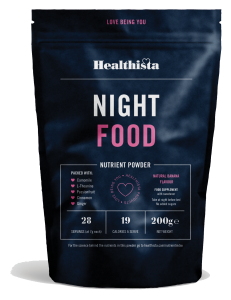
MORE: Need a protein powder for weight loss? These are the 6 ingredients to look for
MORE: 30 foods to boost your mood
Picture of Rick Ray, nutrition physiologist
Rick Hay is an Anti-Ageing and Fitness Nutritionist with many years clinical experience in nutrition, naturopathy, botanical medicine and iridology. He specializes in obesity treatment and weight management. He writes a regular Natural Health and Fitness Blog for Healthista. Find out more at rickhay.co.uk. Follow Rick on Twitter @nutritiomalphys
Like this article? Sign up to our newsletter to get more articles like this delivered straight to your inbox.



